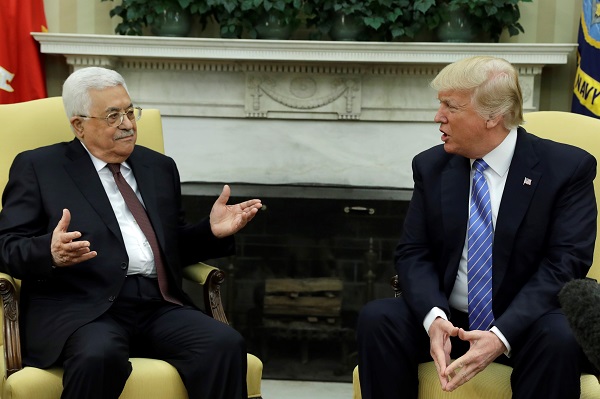Many major Jewish organizations are expressing support for the idea of reducing U.S. aid to the Palestinians after President Donald Trump mentioned the possibility of a cut in a tweet this week.
By: Rafael Medoff/JNS
In a Jan. 2 tweet, the president wrote, “We pay the Palestinians HUNDRED OF MILLIONS OF DOLLARS a year and get no appreciation or respect…with the Palestinians no longer willing to talk peace, why should we make any of these massive future payments to them?”
U.S. Ambassador to the United Nations Nikki Haley said the same day that Trump “doesn’t want to give any additional funding until the Palestinians agree to come back to the negotiation table.”
Some American aid to the Palestinians is sent to the Palestinian Authority (PA), some is given directly to Palestinian projects in PA-controlled areas and some is channeled through U.N. agencies that assist the Palestinians, such as the U.N. Relief and Works Agency for Palestine Refugees in the Near East. The current annual U.S. contribution to the Palestinians totals more than $600 million.
AIPAC spokesman Marshall Wittmann told JNS, “We have supported and continue to support reductions in assistance to the Palestinian Authority based on actions such as payments to families of terrorists and violation of its peace process commitment to direct talks with Israel, instead seeking to have the international community endorse Palestinian objectives.”
PA ‘Tone-Deaf’ to US Warnings
Malcolm Hoenlein, executive vice chairman and CEO of the Conference of Presidents of Major American Jewish Organizations, said the Palestinian Authority “has proven tone-deaf to every previous U.S. warning about its actions, so perhaps some reduction in aid would finally get its attention.” Hoenlein told JNS that the Trump administration “has a right to standards for aid that it provides, and where countries violate those standards, or trample human rights, then the U.S. absolutely has a right to withhold aid—especially when all the U.S. is asking the PA to do is to negotiate. That’s not exactly some major concession.”
“It is reasonable for the U.S. to use foreign aid as one of several mechanisms for responding to instances where its own interests, or the interests of its allies, are threatened,” B’nai B’rith International said in a statement to JNS. “The Palestinians have refused to negotiate directly with Israel, have failed to comply with their obligations under previous agreements, and have chosen instead to pursue an anti-Israel, anti-U.S. agenda at the United Nations.”
David Harris, CEO of the American Jewish Committee, told JNS that “if the Palestinian Authority balks at advancing the peace process, or if it engages in anti-American rhetoric or behavior, then, of course, it’s appropriate to send a strong message of disapproval, including a cut in support.” At the same time, however, Harris cautioned that “what seems black-and-white from a distance may, in this case, entail at least a few shades of gray and some less-than-ideal options.”
Rabbi Abraham Cooper, associate dean of the Simon Wiesenthal Center, said Trump “is targeting the U.N., Pakistan, and now the Palestinian Authority as a businessperson rather than a politician, asking ‘Am I getting value for my money? If not, and the recipients use American taxpayers’ money to scorn the U.S., why should money continue to flow to them?’ Perhaps the shock therapy of the U.S. not acting as an automatic ATM machine is a good thing.”
Farley Weiss, president of the National Council of Young Israel, which represents more than 100 Orthodox synagogues nationwide, went further. He told JNS that U.S. aid to the Palestinians “should not be contingent on their return to the negotiating table but on their change of policies that support terrorism and inculcate their children with hatred for Jews.” Until those policies are changed, Weiss, said, “we see no prospects for peace regardless of whether they resume peace talks.”
Left-of-Center Voices Disagree
Kenneth Bob, president of Ameinu, formerly known as the Labor Zionist Alliance, told JNS he believes any reduction in U.S. aid would be “counter-productive” because it could impact “essential Israeli-Palestinian security cooperation” and “important humanitarian aid.” Therefore, he said, “I do not see any positive outcome for Israel, the U.S. or the Palestinians from a cut in aid.”
Dr. Michael Koplow, policy director of the dovish Israel Policy Forum, said that while “it is certainly appropriate for the U.S. not to fund regimes that express anti-American sentiments,” that is outweighed by “the risk that reductions or cut-offs in aid will lead to even worse regimes or devastating security consequences.” He noted that the U.S. gives aid to “states that often display mixed feelings about the U.S. at best,” such as Pakistan and Egypt.
Former Democratic National Committee chairman Steve Grossman, who is also a former president of AIPAC, told JNS that he “wouldn’t rule out using American aid to the Palestinians as a vehicle for putting pressure on the Palestinians to act in ways that are consistent with a peace process,” but “it should only be done in extreme cases.”
